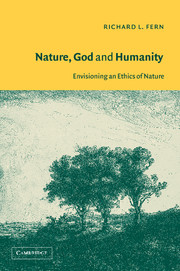6 - Human nature and good
Published online by Cambridge University Press: 22 September 2009
Summary
THE BODY OF HUMANITY
Theistic naturalism understands the love of God manifest in nature as a quest for mutuality, the unity of difference. Here we are reminded of Calvin's bold assertion (1960: 58 [I, 5.5]): “it can be said reverently, provided that it proceeds from a reverent mind, that nature is God.” Calvin's intent is not to deny the Otherness of God but, rather, portray nature as the outworking in time and space of divine creativity. This, in turn, gives theists strong reason to treat nature, wild and human, with respect. What remains to be settled are the moral particulars and, more broadly, our place in nature-as-a-whole. I explore this issue in two, progressively more inclusive steps.
In this chapter, the focus is on humanity and, especially, the imago Dei, the image of God impressed on and borne by human beings. This, I argue, sets us apart, gives us a special responsibility and authority: we cannot fade into the crowd; we are not just one more species. That this is so contains relative to creation-as-a-whole a promise and a threat – for it is in humanity that not only the image of God but, therewith, the relative nothingness, the me on, of creation is most clearly manifest. Human beings are the most vulnerable aspect of creation, the linchpin of success and failure. In our will and well-being hangs the fate of nature. Accordingly, we need to inquire more closely regarding human nature and good.
- Type
- Chapter
- Information
- Nature, God and HumanityEnvisioning an Ethics of Nature, pp. 167 - 200Publisher: Cambridge University PressPrint publication year: 2002



